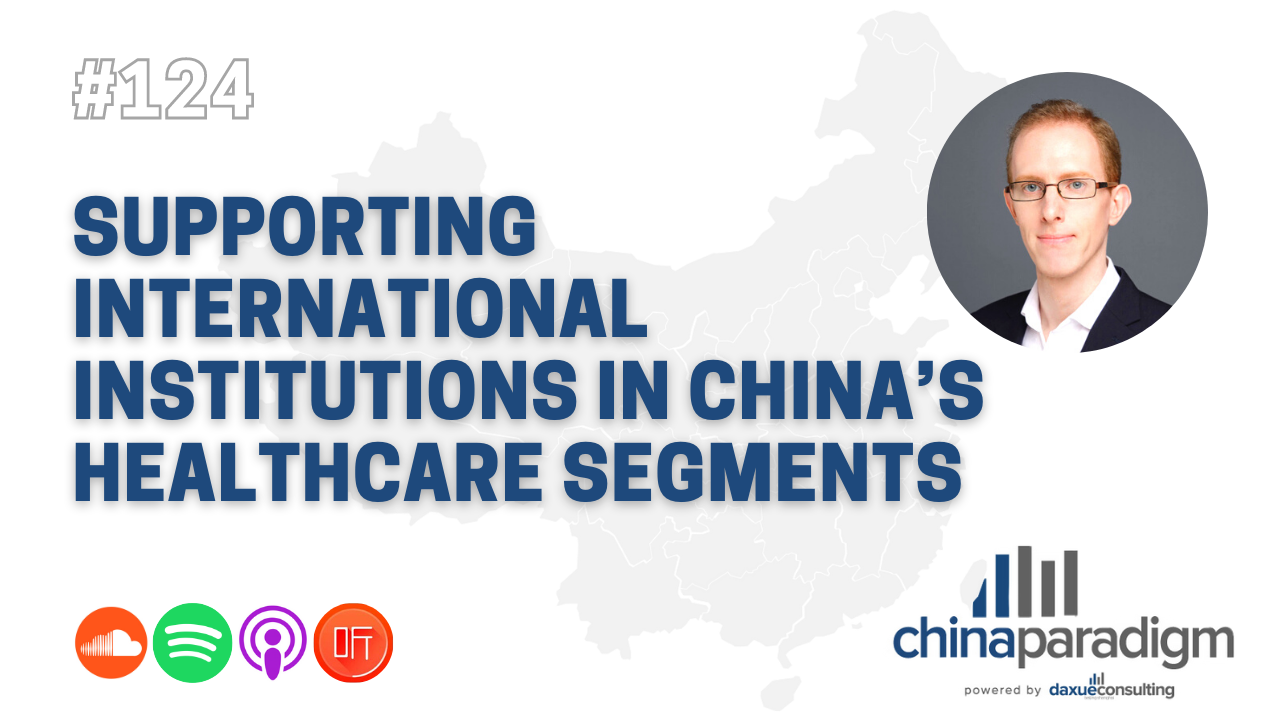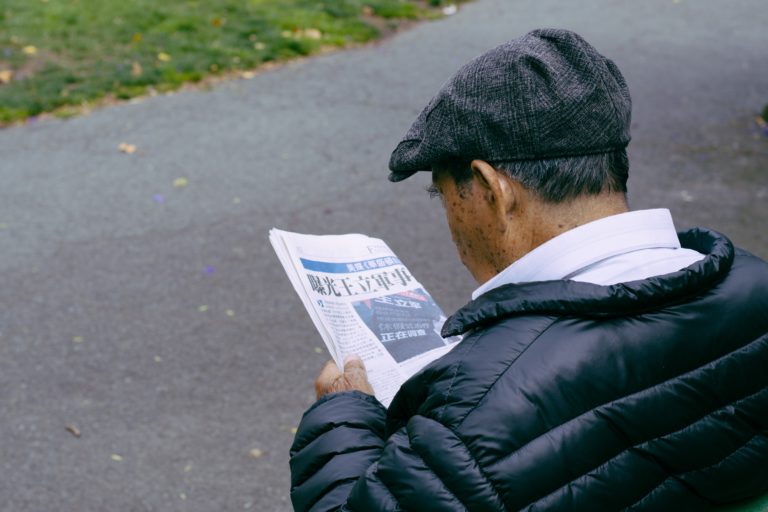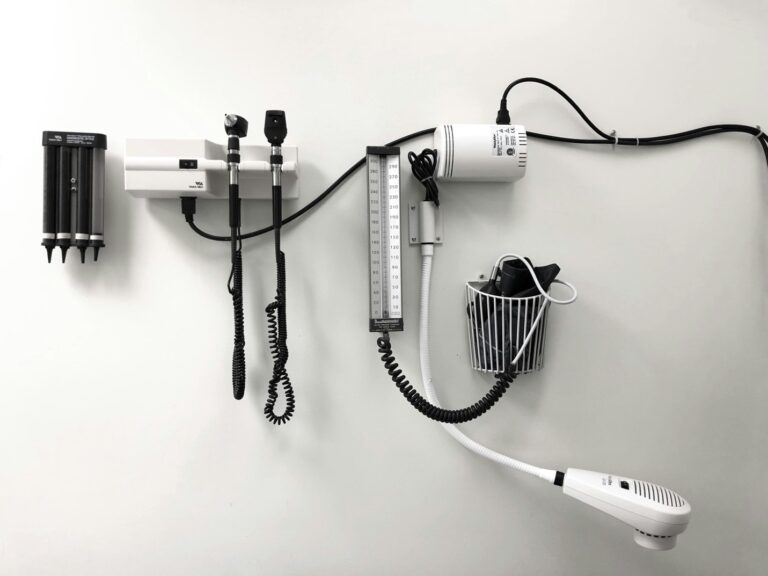This transcript is based on our interview with Douglas Corley, an American healthcare entrepreneur and a bridge between Chinese healthcare R&D and western healthcare institutions. Douglas Corley is the founder and CEO of DHB Global in China. DHB Global provides clients with expert advice on the Chinese healthcare industry.
Listen to the full episode of China Paradigm #124 on YouTube, Apple Podcast, Google Podcast, Spotify, Soundcloud, or Ximalaya.
Here is the transcript from our interview with Chinese healthcare R&D consultant, Douglas Corley
Today we are interviewing a western expert on Chinese healthcare R&D and the Chinese healthcare industry. Douglas Corley came to China 9 years ago, initially teaching English and learning Chinese for what was supposed to be a 6-month sojourn in Dalian before starting medical school in the US. However, he decided to stay and moved to Beijing where he studied at the Chinese Academy of Science. This involved working part-time at Peking University Hospital and the 301 Military Hospital. What he learned was similar to what one would learn working in an R&D laboratory of a healthcare company. Essentially he was working on how to commercialize the Chinese healthcare R&D lab work of healthcare scientists.
Although many of the scientists were highly gifted, they were not used to the commercialization of R&D work. At the time, Douglas realized this was the direction Chinese healthcare R&D was going in. And he was fortunate enough to be in the right place, with the right people, at the right time.
His experience of working in the Chinese healthcare industry is certainly unique among western healthcare experts, and his experience at Beijing’s elite 301 Military Hospital is unrivaled among American peers. This makes Douglas Corley a vital link between Chinese healthcare R&D and the western healthcare industries. This experience led him to founding an events platform, Beijing Health Forum in 2015. Then incorporating this into and founding his China healthcare strategy consulting firm, DHB Global in 2018.
Can you give us a brief company history of DHB Global?
Douglas Corley: DHB stands for Dunhuang Bio. Dunhuang, located in Gansu Province was the area along the ancient Silk Road where healthcare devices and information were traded between China and the West. DHB has consulted with over 250 American and European healthcare players.
What services does DHB Global provide its customers?
DHB helps western healthcare companies enter China. It informs them about the current state of Chinese healthcare R&D. DHB can advise them on who to partner with within China. DHB helps them understand market segmentation in the Chinese healthcare industry.
China’s hospitals/ institutes are divided into 3 main tiers. Tier 1 would be the lowest in terms of capabilities and quality while Tier 3 would be the most capable and adhering to the highest quality standards. In addition, each Tier is subdivided into 3 further levels (A, B, and C).
A rating of 3A would place a hospital among the country’s best hospitals. Likewise, a rating of 1C would place the hospital among the country’s worst. In reality, a 1C hospital is likely to be very small and in a remote area and a 3A hospital/institute is likely to be in Beijing or Shanghai.
In total there 9 classifications for China’s hospitals. The classification system takes into account a hospital’s ability to provide medical care, its medical research capabilities, and the academic level of its staff. There is one additional level called 3AAA. This level is reserved for the most specialized and highly qualified of all hospitals in China. The highest level specialists in China have to teach, publish, and have an active clinic where they treat patients.
How does DHB Global facilitate the link between the Chinese public health institutions and foreign private healthcare companies trying to sell their services on the Chinese market?
DHB helps western healthcare institutions identify the best hospital partners for medical research and which products they want to bring into the Chinese market. Once they know what level of hospital they want to work with, DHB facilitates meetings and discussions between the hospital and the foreign healthcare institutes. They also help with bringing western IP to China and IP collaboration projects between Western and Chinese healthcare R&D players. DHB can introduce Western healthcare players to investors. They can also help them with market operations. This can include access to grants, labs, partner companies, domestic scientists, and product distribution channels.
Are research universities in China incentivized totally different than foreign universities?
If a Chinese healthcare R&D academic gets research published in a top-level medical journal they can earn anywhere from $15 – 50 thousand. This incentivized researchers to split up one major idea into multiple smaller ideas. The government has recently begun to crack down on this practice. Another result of this is that you see some copycatting. For example, the invention of a new molecule: An entrepreneurial Chinese healthcare R&D institute may take a recently invented molecule and add some tiny adjustments to it that don’t necessarily affect the outcome but necessitate a new name and hence a new patent for the molecule.
Could you give us a precise example of the scope of services DHB Global provides?
DHB worked with a very large publicly traded company that had a very novel way of diagnosing and managing chronic disease. They wanted to come to China. DHB did market segmentation, SWOT analysis, client interviews, commercial partner interviews, and academic partner interviews. The pre-market process also involved introducing the client to investors and institutes where they could secure grants. DHB helped them set up manufacturing processes in China. The process lasted about 18 months and they now have a legal entity in China and their manufacturing is split between China and India. They are still waiting for product approval because that takes anywhere between 12 and 36 months in China.
What is the level of internalization of operations for DHB Global?
There’s a lot of delegation. For the legal work involved DHB always has somebody who is amazing in that regard and I provide them with the structure. If the project involves three or more stakeholders, DHB will have a project manager who maintains communication between stakeholders. My personal strong value-add is being able to initiate and maintain communication. Product design can be kept in-house. DHB also has a number of medical experts. I have a strong network of domestic or foreign investors and evaluators that can provide expertise in terms of financing. DHB’s main team is about 8 people, which helps us manage 2 – 3 projects. For anything else, we leverage the relationships with other organizations we have built up over the last few years.
Deep dive – the Chinese healthcare system
80% of 3A hospitals in China are in Beijing or Shanghai. This is where the best doctors are working, despite many of the doctors coming from small cities. But, until 4 years ago, there were no policies which allowed these doctors to return and begin practicing in their hometown. Upon graduation from high school, they would have gone to a prestigious medical university in Shanghai or Beijing. By the time they become a highly trained specialist in their 30s or 40s, they’d probably have a family and be less willing to relocate.
On top of this, the equipment they would use in different provinces would be different and they would be unfamiliar with it. It’s not appealing to move to a place where the infrastructure is less developed.
Is there a private healthcare sector developing for smaller Chinese cities?
About 90% of all hospital beds in China are in public hospitals. It is a government aim to increase the share of private hospitals up to 20 – 25%. Also, in the last 3 or so years, the government has started incentivizing and training people in hospital admin roles, which will positively impact the quality of hospital treatment. Johns Hopkins partnered with a university in Beijing to offer a course in this. Also, all of the famous doctors work in public hospitals.
Healthy China 2030 – what are the main directions?
One of the goals is to have enough domestic manufacturing of medicine and advancing its quality. They also want to have more trained doctors because it’s about half the per capita rate that is seen in OECD countries. And not just doctors, but the per capita rate of nurses in China is much lower too. They also want to incorporate AI so people can see doctors remotely. It also aims to increase the level of insurance coverage.
What means will the Chinese government employ in order to fulfil the Healthy China 2030 objectives?
It can often be quite similar to how they attract foreign companies, using some kind of Free Trade Zones. To bring healthcare R&D companies here, they will mostly use science parks which offer companies certain healthcare industry-related perks. Also, access to capital and talent in universities is offered. Tax incentives are also used. The investors are also often located in the science parks too and they will offer investment for equity.
How much autonomy do science parks have in provincial China?
It varies massively from area to area. Certain areas will be very strong in certain categories. And if the government is going to look to invest in certain healthcare products from that category, they will most likely start their search in that science park. An example of how varied these science parks are is that Guangzhou, the city, has over 200 science parks.
What is China’s current vision on nursing homes?
They are looking to ensure those wealthy people who can afford it have access to top level nursing homes. Following this, they are looking to ensure an adequate level for the rest of the population.
How good is the Chinese public health insurance system? Is there room for a private sector in the Chinese public healthcare system?
It depends on your Hukou. If you haven’t transitioned your hukou to the city that you live and work in you can still be covered. You pay upfront, and you can be reimbursed later. The amount of coverage for public insurance you have depends on your level of income.
It’s quite a unique system. If you were to compare it to another country, it’s similar to maybe Vietnam. Public hospitals have a large number of well-qualified, English-speaking doctors. And there is a small but fast-growing number of hospitals that are becoming specialized in certain practices like IVF or stem cell therapy. They don’t want to have every hospital have an amazing level, but they want to have specialist centers where you can stay in the country and get the highest quality care.
What is DHB Global’s experience in dealing with the COVID-19 crisis?
There were lots of people selling sub-standard PPE. Initially, people wanted masks, then they wanted ventilators, then gowns. And for the last 6 months, people have been demanding gloves. Fortunately, I’m in Thailand now, and that is where most of the gloves in the world are made.
How does DHB Global use cryptography to reinforce transparency on its suppliers and supply chain?
DHB has a tool that uses a blockchain that allows our clients to track their purchases from the factory to the client’s address.
What books have inspired Douglas Corley in his entrepreneurial journey?
Measure What Matters by John Doerr.
What does Douglas Corley read to stay up to date with China?
I read the social media posts of the most interesting science parks and Chinese healthcare R&D companies. But the most useful sources are the WeChat groups that I’m in that are related to the Chinese healthcare industry. I spend about an hour every morning or night going through them, taking notes, and keeping the best articles. Also, the FT app is pretty good.
Not much is better than the primary sources though. So, if there is a quote by somebody in an article, I might reach out to that person. Usually, if you reach out to people with a precise question, they are more than happy to qualify what they said. They will often explain to you in greater detail what exactly they meant.
What books on China have been a game-changing read for Douglas Corley?
On China by Henry Kissinger.
What other activity would Douglas Corley pursue should he have extra time?
I would probably teach about the Chinese healthcare industry. Also, more content writing about the current state of Chinese healthcare R&D.
What advice would present Douglas Corley have for his ten years younger version?
I would focus on Chinese characters, also I would advise somebody to practice with one specific dialect.
This transcript is a sample of our China Paradigm podcast interview with Douglas Corley, founder and CEO at DHB Global.
Listen to the full episode of China Paradigm #124 on YouTube, Apple Podcast, Google Podcast, Spotify, Soundcloud, or Ximalaya.





